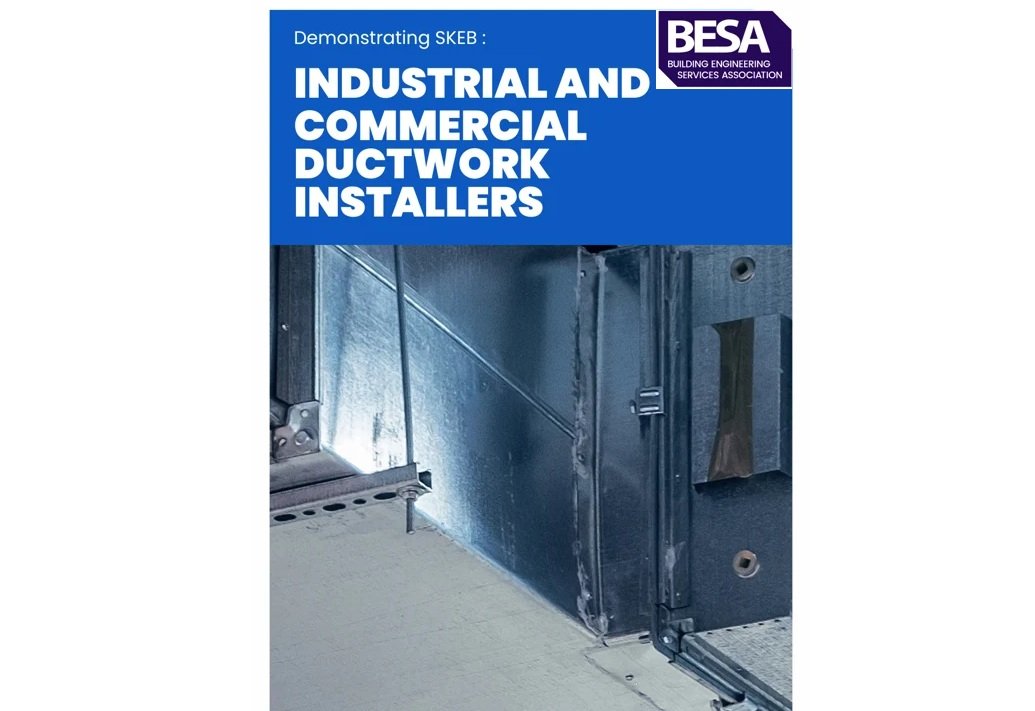The Building Engineering Services Association (BESA) has released the first in a new series of toolkits aimed at helping building services firms and professionals demonstrate competence and comply with building safety legislation.
The free-to-download guide supports application of the Skills, Knowledge, Experience and Behaviours (SKEB) model. It is designed to assist individuals and organisations in evidencing and understanding competence requirements under the Building Safety Act and related standards.
This first toolkit focuses on industrial and commercial ductwork installation. It outlines six key areas where compliance evidence is needed: health, safety and environmental legislation; workplace relationships; preparation of work; system and equipment identification; installation and testing; and pre-commissioning checks.
The guide includes templates for recording qualifications, assessments, experience, and examples of professional behaviour. It was developed in collaboration with Milford & Marah, the Association of Ductwork Contractors and Allied Services (ADCAS), and the Association for Specialist Fire Protection (ASFP).
The content aligns with work by the Engineering and Building Services Skills Authority (EBSSA) and the Industry Competence Steering Group (ICSG), which are developing national frameworks in response to the Hackitt Review following the Grenfell Tower fire.
“This guide has been designed to help individuals and companies simplify the process of measuring and assessing competence in a practical and easy to understand way,” said Rachel Davidson, BESA’s director of specialist knowledge.
Jon Vanstone, Chair of the Industry Competence Committee, added: “The SKEB Toolkit is a clear and practical example of what good looks like when sector-led initiatives meet the ambitions of national policy.”
Further toolkits for other building engineering disciplines are planned as part of the series.
The SKEB toolkit can be downloaded free of charge here.
02 July 2025
BESA launches first SKEB competence toolkit for ductwork installers
Related news
Danfoss opens water test lab for tailored nozzle performance valida...
Danfoss has opened a new water test laboratory at its Nordborg production site, offering tailored nozzle performance testing for customers in applications such as humidification, dust suppression, ...
26 Jun 2025
Vertiv unveils cooling and power architecture for NVIDIA GB300 NVL72
Vertiv has introduced a 142 kW energy-efficient cooling and power reference architecture for the NVIDIA GB300 NVL72 platform. The design is available as SimReady 3D assets in the NVIDIA Omniverse B...
17 Jun 2025
Caverion Austria acquires Lepuschitz Kältetechnik GmbH
Caverion Austria has acquired Lepuschitz Kältetechnik GmbH, a refrigeration specialist based in Wernberg, Carinthia. The acquired company employs 18 people and generates annual revenue of approxima...
yesterday
Eurovent air filters group re-elects Schmidt and Caesar
The Eurovent Product Group ‘Air Filters’ has unanimously re-elected Marc Schmidt as Chairman and Thomas Caesar as Vice-Chairman for a new term. The vote ensures the continuation of a leadership...
25 Jun 2025
BESA: Data centre demand drives shift in lead contractor roles
Building services contractors are increasingly taking the lead on UK data centre projects, according to the Building Engineering Services Association (BESA). The trend was highlighted in the Associ...
29 Jun 2025
Maurizio Marchesini confirmed as Assoclima President for 2025–2027 ...
The General Assembly of Assoclima – Costruttori Sistemi di Climatizzazione, part of Anima Confindustria, has reappointed Maurizio Marchesini as President of the Association for the 2025–2027 term.
...
30 Jun 2025
